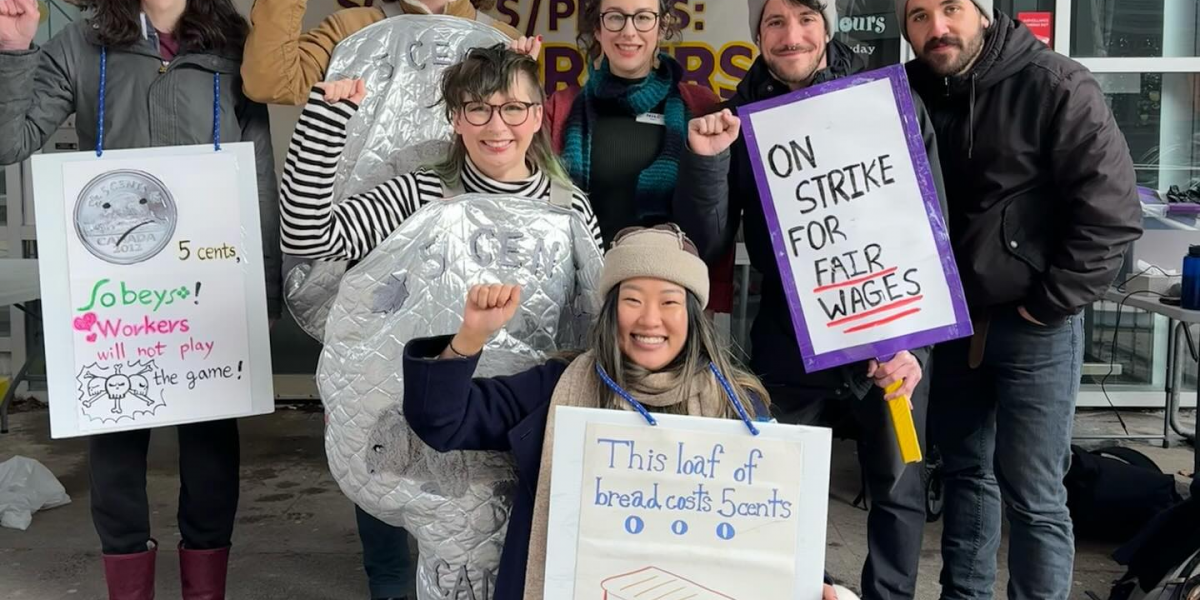In the first week of 2024, two things happened in Nova Scotia that will have an impact on workers in this province.
The first was the release of the Nova Scotia Minimum Wage Review Committee Report on January 3, prepared in December 2023. The committee’s recommendation amounts to a twenty cent increase from the current $15 minimum wage. One of the committee’s worker representatives submitted a dissenting opinion, noting that the province’s current formula for determining the minimum wage results in workers being paid too little, and therefore does not allow workers to manage the current cost of living.
The second was the January 5 announcement that the workers of the Sobeys-owned downtown Halifax grocery store Pete’s Frootique ratified their first collective agreement. Workers had unionized over a year ago and the first contract comes after a seven week strike by the workers.
SEIU Local 2 released some of the details of the agreement on January 8, and it is worth noting what the workers have won though their hard-fought strike. Wage increases, paid sick days, and vacation days are among the improvements.
What Pete’s workers won
Prior to stopping work and setting up their picket lines, all of the workers were making the Nova Scotia $15 minimum wage. When they go back to work, they will be making between $15.45 and $19.57, with most making $15.60 by April 1. They will also be getting annual increases.
This is where the issue of the provincial minimum wage and this recently resolved strike action converge in a sharp way. Workers at Pete’s won a crucial new provision in their contract that protects the first three wage levels’ relativity to the provincial minimum wage. As the SEIU Local 2 statement explains, “If the minimum wage eclipses the probationary rate, the first three wage levels will see relative increases.”
This is a major win for workers’ at Pete’s, but it is also a win for all workers. It means that Pete’s workers will directly benefit when the floor of workers’ standards are raised and it will cut against attempts to divide unionized and non-unionized workers. This is a model other unionized workers should look to.
Union and non-union workers united
As noted in the December 2023 report, minimum wage earners in Nova Scotia work primarily in the retail trade, food, and accommodation industries. The outcome of the strike at Pete’s establishes the first unionized toehold in the grocery sector on mainland Nova Scotia, and its success is highly encouraging for other workers who might be hoping to organize their own low-wage workplaces.
When the vast majority of employers in low-wage sectors are setting employee wages, their starting point for wages has little to do with any moral argument about decent pay and the cost of living, or any true calculation of the current dire costs of rent, food, and essentials that workers require to make ends meet. It comes down to a consideration of these three things: the employer’s bottom line, the lowest legally required wage they are permitted to pay, and how little they think they can get away with paying while still meeting the operational requirements of their business.
The best, most direct, and most effective way to improve things for workers is for workers themselves to organize to change the conditions of their work. This means building the collective power capable of forcing the government to raise employment standards for all and pressuring employers to go beyond those standards.
Worker-led campaigns to raise the minimum wage play an essential supporting role to workplace-based struggles for fair wages. Imagine the wages we could win for workers at Pete’s and all other Nova Scotia grocery stores if Nova Scotia implemented a $20 minimum wage.
After years of paltry increases, and after the economic conditions presented by the COVID-19 pandemic made the issue especially urgent, the Nova Scotia government finally accepted a set of recommendations to raise the minimum wage by a higher amount on a more accelerated timeline.
Reaching $15 an hour in October 2023 could not have happened without the persistent campaigning of the labour movement and groups like Justice for Workers Nova Scotia, and it’s important that we don’t stop here. Employers and their allies are eager to put the brakes on wages, and it’s up to us all to keep organizing for what workers deserve.
Pete’s workers show us the power we have as workers to take on the boss and win.
Did you like this article? Help us produce more like it by donating $1, $2, or $5. Donate


